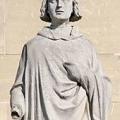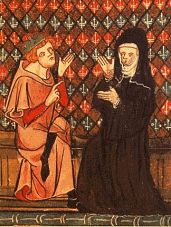208. Get Thee to a Nunnery: Heloise and Abelard
Posted on
Peter Abelard and Heloise prove themselves to be fascinating thinkers as well as star-crossed lovers.
Themes:
Further Reading
• B. Radice and M.T. Clanchy, The Letters of Abelard and Heloise (London: 2003).
• D. Luscombe (ed.), The Letter Collection of Abelard and Heloise (Oxford: 2013).
• J.E. Brower and K. Guilfoy, The Cambridge Companion to Abelard (Cambridge: 2004).
• M.T. Clanchy, Abelard: a Medieval Life (Oxford: 1997).
• J. Marenbon, The Philosophy of Peter Abelard (Cambridge: 1997).
• C.J. Mews, Peter Abelard (London: 1995).
• C.J. Mews, Abelard and Heloise (New York: 2005).
• B. Wheeler (ed.), Listening to Heloise: the Voice of a Twelfth-Century Woman (New York: 2000).
Stanford Encyclopedia: Peter Abelard
In Our Time: Abelard and Heloise







Comments
Another reference
Hi Peter,
thanks for this podcast - like its subjects, it was fascinating. One of the other things that attracted Heloise to Abelard was that he apparently sang very well and wrote music.
One reference that I have found quite accessible and interesting is Etienne Gilson's "Heloise and Abelard". Gilson details the reasons for Fulbert's suspicion and action against Abelard - that he was ridding himself of Heloise.
I have always wondered about Astrolabe - the couple's son. He is mentioned once in passing, and he is sent off to Britanny and disappears. He is not mentioned in his parents' letters - it is as though they forgot him completely.
As for the moving of the bodies in 1817 from the monastery to the Père-Lachaise Cemetery was not without opposition by the Cathoic Church in France, and was seen as a fundamentally anti-clerical act.
As you may be aware, in 2003 Constance Mews claimed to have uncovered previously unknown letters between the lovers. This was certainly exciting - but I have heard very little about this during that time. I read the letters, and I was not convinced by the text - it was very flowery, and it seemed to me from a latter time than the 12th century.
I would also say that Abelard's Historia Calamitatum could almost read as an existentialist novel in the manner of Camus' L'Étranger or La Chute.
In reply to Another reference by Bear
Abelard and Heloise
Thanks for the comments. I actually have a note on Mews' theory in the written version of this episode (which will later be a chapter in the book version) but I don't try to decide the issue, just mention it. Regarding the weirdly named Astrolabe there is the hypothesis that some version of his name is an anagram of Abelard's!
In reply to Abelard and Heloise by Peter Adamson
I don't buy the anagram…
I don't buy the anagram theory. But I think there may be more to the Adelard / Abelard thing than is typically noticed.
I know this will sound like…
I know this will sound like a stretch, but the only place I've heard the name Roscelin before was Rosalyn from Calvin and Hobbes. Which of course makes me wonder now if that was intentional, although it would be pretty obscure. Either way, I'm now picturing Roscelin as an angry babysitter.
Add new comment